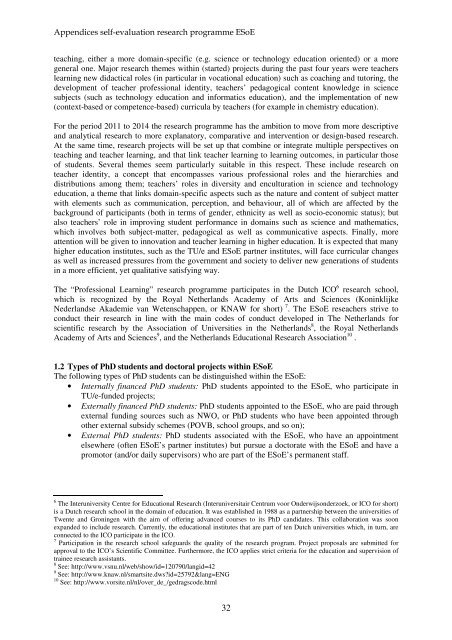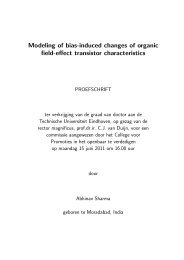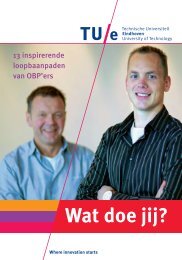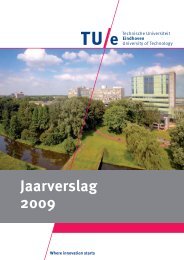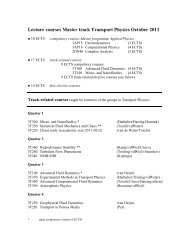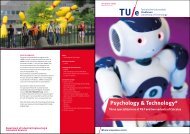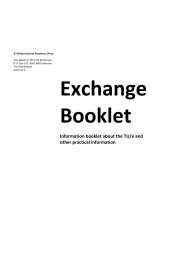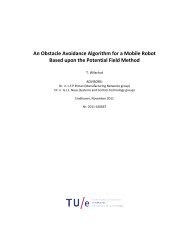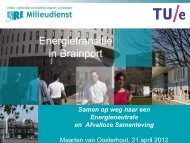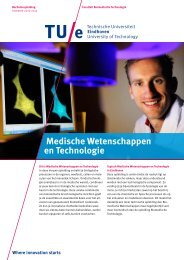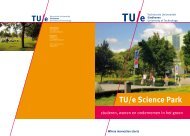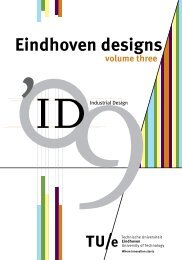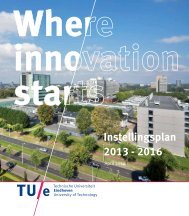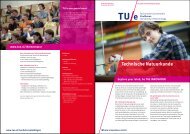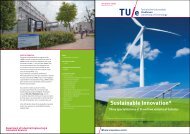Self-evaluation - Technische Universiteit Eindhoven
Self-evaluation - Technische Universiteit Eindhoven
Self-evaluation - Technische Universiteit Eindhoven
You also want an ePaper? Increase the reach of your titles
YUMPU automatically turns print PDFs into web optimized ePapers that Google loves.
Appendices self-<strong>evaluation</strong> research programme ESoE<br />
teaching, either a more domain-specific (e.g. science or technology education oriented) or a more<br />
general one. Major research themes within (started) projects during the past four years were teachers<br />
learning new didactical roles (in particular in vocational education) such as coaching and tutoring, the<br />
development of teacher professional identity, teachers’ pedagogical content knowledge in science<br />
subjects (such as technology education and informatics education), and the implementation of new<br />
(context-based or competence-based) curricula by teachers (for example in chemistry education).<br />
For the period 2011 to 2014 the research programme has the ambition to move from more descriptive<br />
and analytical research to more explanatory, comparative and intervention or design-based research.<br />
At the same time, research projects will be set up that combine or integrate multiple perspectives on<br />
teaching and teacher learning, and that link teacher learning to learning outcomes, in particular those<br />
of students. Several themes seem particularly suitable in this respect. These include research on<br />
teacher identity, a concept that encompasses various professional roles and the hierarchies and<br />
distributions among them; teachers’ roles in diversity and enculturation in science and technology<br />
education, a theme that links domain-specific aspects such as the nature and content of subject matter<br />
with elements such as communication, perception, and behaviour, all of which are affected by the<br />
background of participants (both in terms of gender, ethnicity as well as socio-economic status); but<br />
also teachers’ role in improving student performance in domains such as science and mathematics,<br />
which involves both subject-matter, pedagogical as well as communicative aspects. Finally, more<br />
attention will be given to innovation and teacher learning in higher education. It is expected that many<br />
higher education institutes, such as the TU/e and ESoE partner institutes, will face curricular changes<br />
as well as increased pressures from the government and society to deliver new generations of students<br />
in a more efficient, yet qualitative satisfying way.<br />
The “Professional Learning” research programme participates in the Dutch ICO 6 research school,<br />
which is recognized by the Royal Netherlands Academy of Arts and Sciences (Koninklijke<br />
Nederlandse Akademie van Wetenschappen, or KNAW for short) 7 . The ESoE reseachers strive to<br />
conduct their research in line with the main codes of conduct developed in The Netherlands for<br />
scientific research by the Association of Universities in the Netherlands 8 , the Royal Netherlands<br />
Academy of Arts and Sciences 9 , and the Netherlands Educational Research Association 10 .<br />
1.2 Types of PhD students and doctoral projects within ESoE<br />
The following types of PhD students can be distinguished within the ESoE:<br />
• Internally financed PhD students: PhD students appointed to the ESoE, who participate in<br />
TU/e-funded projects;<br />
• Externally financed PhD students: PhD students appointed to the ESoE, who are paid through<br />
external funding sources such as NWO, or PhD students who have been appointed through<br />
other external subsidy schemes (POVB, school groups, and so on);<br />
• External PhD students: PhD students associated with the ESoE, who have an appointment<br />
elsewhere (often ESoE’s partner institutes) but pursue a doctorate with the ESoE and have a<br />
promotor (and/or daily supervisors) who are part of the ESoE’s permanent staff.<br />
6 The Interuniversity Centre for Educational Research (Interuniversitair Centrum voor Onderwijsonderzoek, or ICO for short)<br />
is a Dutch research school in the domain of education. It was established in 1988 as a partnership between the universities of<br />
Twente and Groningen with the aim of offering advanced courses to its PhD candidates. This collaboration was soon<br />
expanded to include research. Currently, the educational institutes that are part of ten Dutch universities which, in turn, are<br />
connected to the ICO participate in the ICO.<br />
7 Participation in the research school safeguards the quality of the research program. Project proposals are submitted for<br />
approval to the ICO’s Scientific Committee. Furthermore, the ICO applies strict criteria for the education and supervision of<br />
trainee research assistants.<br />
8 See: http://www.vsnu.nl/web/show/id=120790/langid=42<br />
9 See: http://www.knaw.nl/smartsite.dws?id=25792&lang=ENG<br />
10 See: http://www.vorsite.nl/nl/over_de_/gedragscode.html<br />
32


